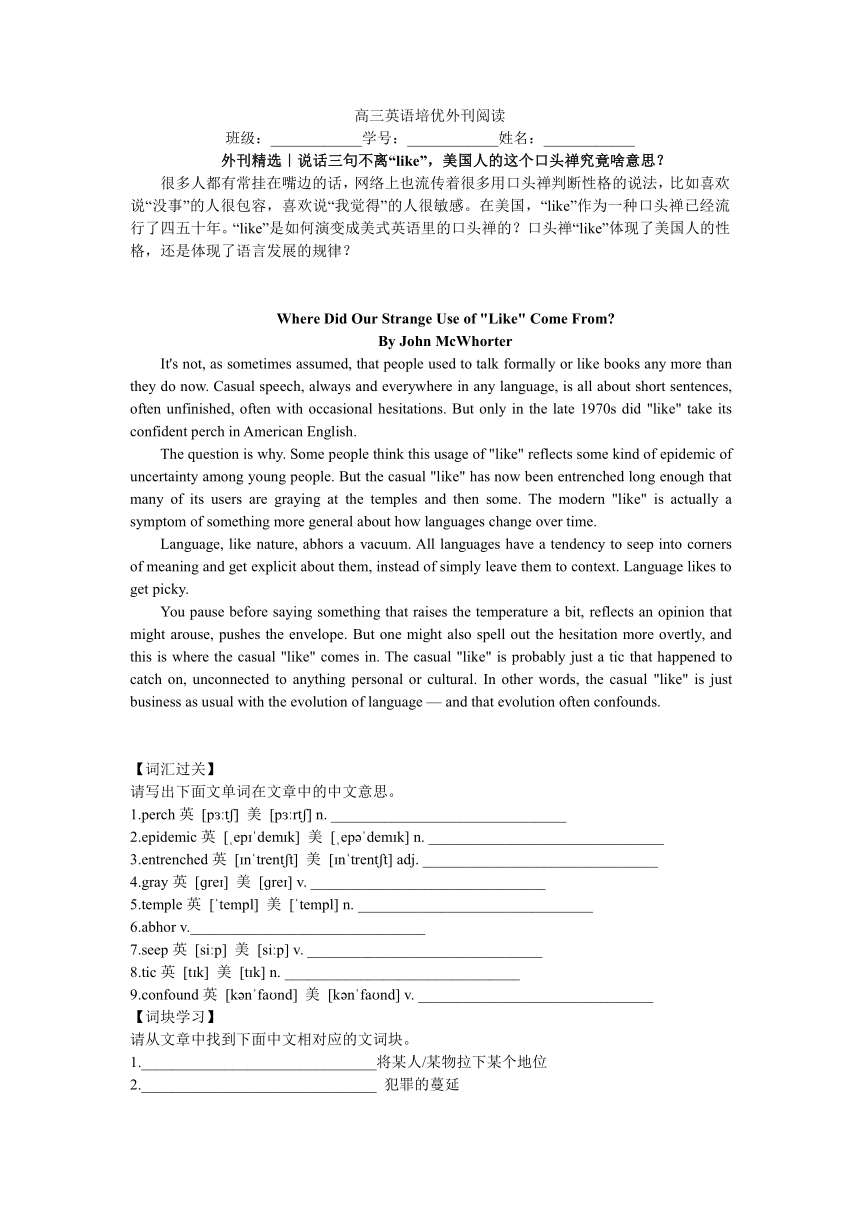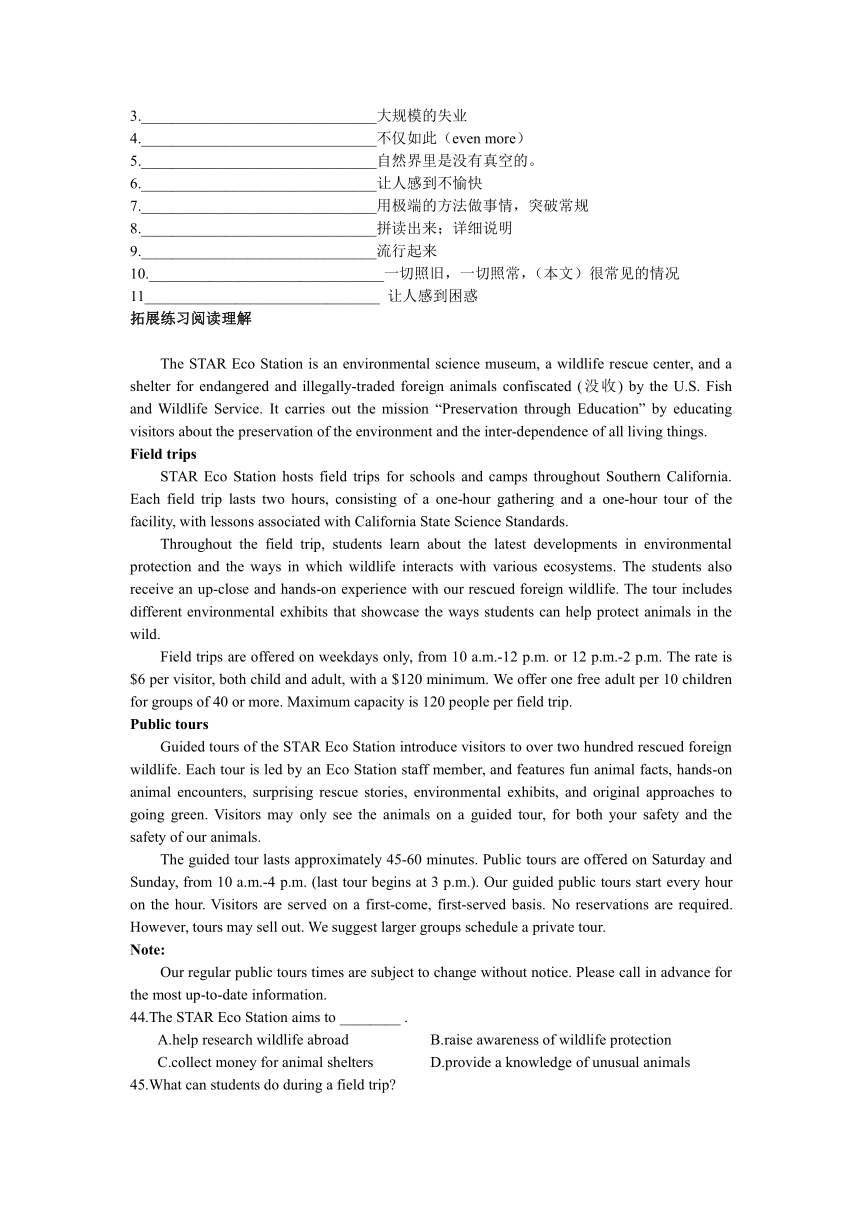2024届高三下学期英语培优外刊阅读学案 口头禅话题(含答案)
文档属性
| 名称 | 2024届高三下学期英语培优外刊阅读学案 口头禅话题(含答案) |  | |
| 格式 | docx | ||
| 文件大小 | 18.3KB | ||
| 资源类型 | 教案 | ||
| 版本资源 | 通用版 | ||
| 科目 | 英语 | ||
| 更新时间 | 2024-05-19 20:35:19 | ||
图片预览


文档简介
高三英语培优外刊阅读
班级:____________学号:____________姓名:____________
外刊精选|说话三句不离“like”,美国人的这个口头禅究竟啥意思?
很多人都有常挂在嘴边的话,网络上也流传着很多用口头禅判断性格的说法,比如喜欢说“没事”的人很包容,喜欢说“我觉得”的人很敏感。在美国,“like”作为一种口头禅已经流行了四五十年。“like”是如何演变成美式英语里的口头禅的?口头禅“like”体现了美国人的性格,还是体现了语言发展的规律?
Where Did Our Strange Use of "Like" Come From
By John McWhorter
It's not, as sometimes assumed, that people used to talk formally or like books any more than they do now. Casual speech, always and everywhere in any language, is all about short sentences, often unfinished, often with occasional hesitations. But only in the late 1970s did "like" take its confident perch in American English.
The question is why. Some people think this usage of "like" reflects some kind of epidemic of uncertainty among young people. But the casual "like" has now been entrenched long enough that many of its users are graying at the temples and then some. The modern "like" is actually a symptom of something more general about how languages change over time.
Language, like nature, abhors a vacuum. All languages have a tendency to seep into corners of meaning and get explicit about them, instead of simply leave them to context. Language likes to get picky.
You pause before saying something that raises the temperature a bit, reflects an opinion that might arouse, pushes the envelope. But one might also spell out the hesitation more overtly, and this is where the casual "like" comes in. The casual "like" is probably just a tic that happened to catch on, unconnected to anything personal or cultural. In other words, the casual "like" is just business as usual with the evolution of language — and that evolution often confounds.
【词汇过关】
请写出下面文单词在文章中的中文意思。
1.perch英 [p t ] 美 [p rt ] n. _______________________________
2.epidemic英 [ ep dem k] 美 [ ep dem k] n. _______________________________
3.entrenched英 [ n trent t] 美 [ n trent t] adj. _______________________________
4.gray英 [ɡre ] 美 [ɡre ] v. _______________________________
5.temple英 [ templ] 美 [ templ] n. _______________________________
6.abhor v._______________________________
7.seep英 [si p] 美 [si p] v. _______________________________
8.tic英 [t k] 美 [t k] n. _______________________________
9.confound英 [k n fa nd] 美 [k n fa nd] v. _______________________________
【词块学习】
请从文章中找到下面中文相对应的文词块。
1._______________________________将某人/某物拉下某个地位
2._______________________________ 犯罪的蔓延
3._______________________________大规模的失业
4._______________________________不仅如此(even more)
5._______________________________自然界里是没有真空的。
6._______________________________让人感到不愉快
7._______________________________用极端的方法做事情,突破常规
8._______________________________拼读出来;详细说明
9._______________________________流行起来
10._______________________________一切照旧,一切照常,(本文)很常见的情况
11_______________________________ 让人感到困惑
拓展练习阅读理解
The STAR Eco Station is an environmental science museum, a wildlife rescue center, and a shelter for endangered and illegally-traded foreign animals confiscated (没收) by the U.S. Fish and Wildlife Service. It carries out the mission “Preservation through Education” by educating visitors about the preservation of the environment and the inter-dependence of all living things.
Field trips
STAR Eco Station hosts field trips for schools and camps throughout Southern California. Each field trip lasts two hours, consisting of a one-hour gathering and a one-hour tour of the facility, with lessons associated with California State Science Standards.
Throughout the field trip, students learn about the latest developments in environmental protection and the ways in which wildlife interacts with various ecosystems. The students also receive an up-close and hands-on experience with our rescued foreign wildlife. The tour includes different environmental exhibits that showcase the ways students can help protect animals in the wild.
Field trips are offered on weekdays only, from 10 a.m.-12 p.m. or 12 p.m.-2 p.m. The rate is $6 per visitor, both child and adult, with a $120 minimum. We offer one free adult per 10 children for groups of 40 or more. Maximum capacity is 120 people per field trip.
Public tours
Guided tours of the STAR Eco Station introduce visitors to over two hundred rescued foreign wildlife. Each tour is led by an Eco Station staff member, and features fun animal facts, hands-on animal encounters, surprising rescue stories, environmental exhibits, and original approaches to going green. Visitors may only see the animals on a guided tour, for both your safety and the safety of our animals.
The guided tour lasts approximately 45-60 minutes. Public tours are offered on Saturday and Sunday, from 10 a.m.-4 p.m. (last tour begins at 3 p.m.). Our guided public tours start every hour on the hour. Visitors are served on a first-come, first-served basis. No reservations are required. However, tours may sell out. We suggest larger groups schedule a private tour.
Note:
Our regular public tours times are subject to change without notice. Please call in advance for the most up-to-date information.
44.The STAR Eco Station aims to ________ .
A.help research wildlife abroad B.raise awareness of wildlife protection
C.collect money for animal shelters D.provide a knowledge of unusual animals
45.What can students do during a field trip
A.Make a speech on the environment. B.Take part in foreign wildlife rescue.
C.Get to know why species get endangered. D.Learn how living things affect each other.
46.For a guided tour, visitors should know that________.
A.large groups are served first B.it is available on weekdays
C.its time could change D.booking is needed
外刊精选答案
【词汇过关】
请写出下面文单词在文章中的中文意思。
1.perch英 [p t ] 美 [p rt ] n. 高处
2.epidemic英 [ ep dem k] 美 [ ep dem k] n. (本文)蔓延;传染病
3.entrenched英 [ n trent t] 美 [ n trent t] adj. 稳固的,不易改变的
4.gray英 [ɡre ] 美 [ɡre ] v. 变灰白,变花白
5.temple英 [ templ] 美 [ templ] n. 太阳穴,鬓角
6.abhor v. 厌恶,憎恶
7.seep英 [si p] 美 [si p] v. 渗漏,渗透
8.tic英 [t k] 美 [t k] n. 口头禅
9.confound英 [k n fa nd] 美 [k n fa nd] v. 使困惑
【词块学习】
请从文章中找到下面中文相对应的文词块。
1.knock somebody/something off the perch 将某人/某物拉下某个地位
2.a crime epidemic 犯罪的蔓延
3.an unemployment epidemic 大规模的失业
4.and then some不仅如此(even more)
5.Nature abhors a vacuum.自然界里是没有真空的。
6.raise the temperature让人感到不愉快
7.push the envelope用极端的方法做事情,突破常规
8.spell out拼读出来;详细说明
9.catch on流行起来
10.business as usual一切照旧,一切照常,(本文)很常见的情况
11.confound somebody 让人感到困惑
【全文翻译】
“like”这个词的奇怪用法,从何而来?
有些时候我们会以为,以前的人比现在说话更正式、更像书面语,但不是的。无论在哪种语言里,日常用语都一直表现为短句子,而且往往不完整,还时常带着犹豫。但直到20世纪70年代后期,“like”这个词才在美式英语里站稳了脚跟。
问题是,为什么会这样?有人认为,“like”的这种用法反映的,是在年轻人中普遍存在的一种不确定感。但是,“like”的非正式用法已经固化多年,它的许多使用者已经步入了中老年的行列。“like”的现代用法实际上反映的是语言随着时间演变的普遍规律。
和大自然一样,语言最厌恶的一种状态就是真空。所有的语言都有一个倾向,就是渗透到意义的各个角落,把意义明确表达出来,而不是仅仅让语境来表达意义。语言喜欢吹毛求疵。
如果你要说的话会让对方不爽、是个会激起情绪的观点、或者会挑战对方观念的时候,你在开口之前会停顿一下。但有时你也会想把自己的犹豫表现得更为明显。这时,随意版“like”就出现了。这种用法,很可能只是个碰巧流行起来的口头禅,和个人性格或者文化背景都没什么关系。换句话说,“like”的随意使用只是语言进化中的一种常见情况,而这一过程常常让人摸不着头脑。
拓展练习阅读理解参考答案
44.B 45.D 46.C
班级:____________学号:____________姓名:____________
外刊精选|说话三句不离“like”,美国人的这个口头禅究竟啥意思?
很多人都有常挂在嘴边的话,网络上也流传着很多用口头禅判断性格的说法,比如喜欢说“没事”的人很包容,喜欢说“我觉得”的人很敏感。在美国,“like”作为一种口头禅已经流行了四五十年。“like”是如何演变成美式英语里的口头禅的?口头禅“like”体现了美国人的性格,还是体现了语言发展的规律?
Where Did Our Strange Use of "Like" Come From
By John McWhorter
It's not, as sometimes assumed, that people used to talk formally or like books any more than they do now. Casual speech, always and everywhere in any language, is all about short sentences, often unfinished, often with occasional hesitations. But only in the late 1970s did "like" take its confident perch in American English.
The question is why. Some people think this usage of "like" reflects some kind of epidemic of uncertainty among young people. But the casual "like" has now been entrenched long enough that many of its users are graying at the temples and then some. The modern "like" is actually a symptom of something more general about how languages change over time.
Language, like nature, abhors a vacuum. All languages have a tendency to seep into corners of meaning and get explicit about them, instead of simply leave them to context. Language likes to get picky.
You pause before saying something that raises the temperature a bit, reflects an opinion that might arouse, pushes the envelope. But one might also spell out the hesitation more overtly, and this is where the casual "like" comes in. The casual "like" is probably just a tic that happened to catch on, unconnected to anything personal or cultural. In other words, the casual "like" is just business as usual with the evolution of language — and that evolution often confounds.
【词汇过关】
请写出下面文单词在文章中的中文意思。
1.perch英 [p t ] 美 [p rt ] n. _______________________________
2.epidemic英 [ ep dem k] 美 [ ep dem k] n. _______________________________
3.entrenched英 [ n trent t] 美 [ n trent t] adj. _______________________________
4.gray英 [ɡre ] 美 [ɡre ] v. _______________________________
5.temple英 [ templ] 美 [ templ] n. _______________________________
6.abhor v._______________________________
7.seep英 [si p] 美 [si p] v. _______________________________
8.tic英 [t k] 美 [t k] n. _______________________________
9.confound英 [k n fa nd] 美 [k n fa nd] v. _______________________________
【词块学习】
请从文章中找到下面中文相对应的文词块。
1._______________________________将某人/某物拉下某个地位
2._______________________________ 犯罪的蔓延
3._______________________________大规模的失业
4._______________________________不仅如此(even more)
5._______________________________自然界里是没有真空的。
6._______________________________让人感到不愉快
7._______________________________用极端的方法做事情,突破常规
8._______________________________拼读出来;详细说明
9._______________________________流行起来
10._______________________________一切照旧,一切照常,(本文)很常见的情况
11_______________________________ 让人感到困惑
拓展练习阅读理解
The STAR Eco Station is an environmental science museum, a wildlife rescue center, and a shelter for endangered and illegally-traded foreign animals confiscated (没收) by the U.S. Fish and Wildlife Service. It carries out the mission “Preservation through Education” by educating visitors about the preservation of the environment and the inter-dependence of all living things.
Field trips
STAR Eco Station hosts field trips for schools and camps throughout Southern California. Each field trip lasts two hours, consisting of a one-hour gathering and a one-hour tour of the facility, with lessons associated with California State Science Standards.
Throughout the field trip, students learn about the latest developments in environmental protection and the ways in which wildlife interacts with various ecosystems. The students also receive an up-close and hands-on experience with our rescued foreign wildlife. The tour includes different environmental exhibits that showcase the ways students can help protect animals in the wild.
Field trips are offered on weekdays only, from 10 a.m.-12 p.m. or 12 p.m.-2 p.m. The rate is $6 per visitor, both child and adult, with a $120 minimum. We offer one free adult per 10 children for groups of 40 or more. Maximum capacity is 120 people per field trip.
Public tours
Guided tours of the STAR Eco Station introduce visitors to over two hundred rescued foreign wildlife. Each tour is led by an Eco Station staff member, and features fun animal facts, hands-on animal encounters, surprising rescue stories, environmental exhibits, and original approaches to going green. Visitors may only see the animals on a guided tour, for both your safety and the safety of our animals.
The guided tour lasts approximately 45-60 minutes. Public tours are offered on Saturday and Sunday, from 10 a.m.-4 p.m. (last tour begins at 3 p.m.). Our guided public tours start every hour on the hour. Visitors are served on a first-come, first-served basis. No reservations are required. However, tours may sell out. We suggest larger groups schedule a private tour.
Note:
Our regular public tours times are subject to change without notice. Please call in advance for the most up-to-date information.
44.The STAR Eco Station aims to ________ .
A.help research wildlife abroad B.raise awareness of wildlife protection
C.collect money for animal shelters D.provide a knowledge of unusual animals
45.What can students do during a field trip
A.Make a speech on the environment. B.Take part in foreign wildlife rescue.
C.Get to know why species get endangered. D.Learn how living things affect each other.
46.For a guided tour, visitors should know that________.
A.large groups are served first B.it is available on weekdays
C.its time could change D.booking is needed
外刊精选答案
【词汇过关】
请写出下面文单词在文章中的中文意思。
1.perch英 [p t ] 美 [p rt ] n. 高处
2.epidemic英 [ ep dem k] 美 [ ep dem k] n. (本文)蔓延;传染病
3.entrenched英 [ n trent t] 美 [ n trent t] adj. 稳固的,不易改变的
4.gray英 [ɡre ] 美 [ɡre ] v. 变灰白,变花白
5.temple英 [ templ] 美 [ templ] n. 太阳穴,鬓角
6.abhor v. 厌恶,憎恶
7.seep英 [si p] 美 [si p] v. 渗漏,渗透
8.tic英 [t k] 美 [t k] n. 口头禅
9.confound英 [k n fa nd] 美 [k n fa nd] v. 使困惑
【词块学习】
请从文章中找到下面中文相对应的文词块。
1.knock somebody/something off the perch 将某人/某物拉下某个地位
2.a crime epidemic 犯罪的蔓延
3.an unemployment epidemic 大规模的失业
4.and then some不仅如此(even more)
5.Nature abhors a vacuum.自然界里是没有真空的。
6.raise the temperature让人感到不愉快
7.push the envelope用极端的方法做事情,突破常规
8.spell out拼读出来;详细说明
9.catch on流行起来
10.business as usual一切照旧,一切照常,(本文)很常见的情况
11.confound somebody 让人感到困惑
【全文翻译】
“like”这个词的奇怪用法,从何而来?
有些时候我们会以为,以前的人比现在说话更正式、更像书面语,但不是的。无论在哪种语言里,日常用语都一直表现为短句子,而且往往不完整,还时常带着犹豫。但直到20世纪70年代后期,“like”这个词才在美式英语里站稳了脚跟。
问题是,为什么会这样?有人认为,“like”的这种用法反映的,是在年轻人中普遍存在的一种不确定感。但是,“like”的非正式用法已经固化多年,它的许多使用者已经步入了中老年的行列。“like”的现代用法实际上反映的是语言随着时间演变的普遍规律。
和大自然一样,语言最厌恶的一种状态就是真空。所有的语言都有一个倾向,就是渗透到意义的各个角落,把意义明确表达出来,而不是仅仅让语境来表达意义。语言喜欢吹毛求疵。
如果你要说的话会让对方不爽、是个会激起情绪的观点、或者会挑战对方观念的时候,你在开口之前会停顿一下。但有时你也会想把自己的犹豫表现得更为明显。这时,随意版“like”就出现了。这种用法,很可能只是个碰巧流行起来的口头禅,和个人性格或者文化背景都没什么关系。换句话说,“like”的随意使用只是语言进化中的一种常见情况,而这一过程常常让人摸不着头脑。
拓展练习阅读理解参考答案
44.B 45.D 46.C
